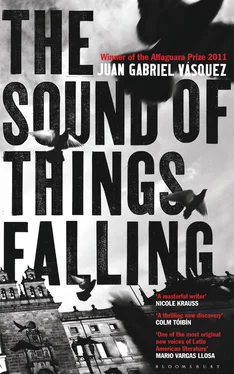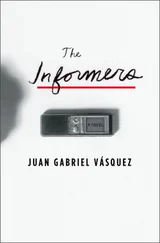I was barely eight years older than these inexperienced students, but between us opened the double abyss of authority and knowledge, things that I had and they, recently arrived in the world, entirely lacked. They admired me, feared me a little, and I realized that one could get used to this fear and admiration, that they were like a drug. I told my students about the potholers who were trapped in a cave and after several days began to eat each other to survive: can the Law defend them or not? I told them about old Shylock, about the pound of flesh he wanted, about the astute Portia, who managed to prevent him from taking it with a pettifogging technicality: I enjoyed watching them gesticulate and shout and lose themselves in ridiculous arguments in their attempts to find, in the thicket of the anecdote, the ideas of Law and Justice. After these academic discussions I’d go to the billiard clubs on 14th Street, low-ceilinged places filled with smoke where my other life went on, a life without doctrines or jurisprudence. There, between small bets and coffee with brandy, my day would draw to a close, sometimes in the company of a colleague or two, sometimes with female students who after a few drinks might end up in my bed. I lived near by, in a tenth-floor apartment where the air was always chilly, where the view of the spiky city of bricks and cement was always good, where my bed was always open to discussions of Cesare Beccaria’s concept of crimes and punishments, or a difficult chapter of Bodenheimer, or even a simple upgrade of a mark by the quickest route. Life, in those days that now seem to have belonged to somebody else, was full of possibilities. The possibilities, as I would later discover, also belonged to somebody else: they were gradually, imperceptibly extinguished, like a tide going out, until they left me with what I am today.
At the time my city was beginning to emerge from the most violent years of its recent history. I’m not talking about the violence of cheap stabbings and stray bullets, the settling of accounts between low-grade dealers, but the kind that transcends the small resentments and small revenges of little people, the violence whose actors are collectives and written with capital letters: the State, the Cartel, the Army, the Front. We bogotanos had become accustomed to it, partially because its images arrived with extraordinary regularity in our news reports and papers; that day, the images of the most recent attack had begun to appear, in the form of a breaking-news bulletin, on the television screen. First we saw the reporter presenting the news from outside the door of the Country Clinic, then we saw the image of the bullet-riddled Mercedes — through the shot-out window we saw the back seat, broken glass, smears of dried blood — and finally, when all movement had ceased at all the tables and everyone had quietened down and someone had shouted to turn up the sound, we saw, above the dates of birth and the still fresh one of his death, the face of the victim in black-and-white. It was the conservative politician Álvaro Gómez, son of one of the most controversial presidents of the century and himself candidate for the presidency more than once. Nobody asked why he’d been killed, or who by, because such questions no longer had any meaning in my city, or they were asked in a mechanical fashion, as the only way to react to the latest shock. I didn’t think so at the time, but those crimes ( magnicides , they called them in the press: I learned the meaning of that little word very early) had provided the backbone of my life or punctuated it like the unexpected visits of a distant relative. I was fourteen years old that afternoon in 1984 when Pablo Escobar killed or ordered the killing of his most illustrious pursuer, the Minister of Justice Rodrigo Lara Bonilla (two hit men on a motorcycle, a curve on 127th Street). I was sixteen when Escobar killed or ordered the killing of Guillermo Cano, publisher of El Espectador (a few steps away from the newspaper’s offices, the assassin put eight bullets in his chest). I was nineteen and already an adult, although I hadn’t voted yet, on the day of the death of Luis Carlos Galán, a presidential candidate, whose assassination was different or is different in our imaginations because it was seen on TV: the crowd cheering Galán, then the machine-gunfire, then the body collapsing on the wooden platform, falling soundlessly or its sound hidden by the uproar or by the first screams. And shortly afterwards there was the Avianca plane, a Boeing 727-21 that Escobar had blown up in mid-air — somewhere in the air between Bogotá and Cali — to kill a politician who wasn’t even on board.
So all the billiard players lamented the crime with a resignation that was by then a sort of national idiosyncrasy, the legacy of our times, and then we went back to our respective games. All, I mean, except for one whose attention remained riveted to the screen, where the images had moved on to the next news item and were now showing a scene of neglect: a bullring full of weeds as high as the flagpoles (or as high as the place where flags once flew), a roof over several vintage cars that were rusting away, a gigantic tyrannosaurus whose body was falling apart revealing a complicated metal structure, sad and naked like an old mannequin. It was the Hacienda Nápoles, Pablo Escobar’s mythical territory, which had once been the headquarters of his empire, now left to its fate since the capo’s death in 1993. The news item was about this neglect: the properties confiscated from the drug traffickers, the millions of dollars wasted by the authorities who didn’t know how to make use of these properties, all the many things that could have been done and hadn’t been done with those fairy-tale assets. And that was when one of the players at the table nearest the television, who up to that moment had not drawn attention to himself in any way, spoke as if talking to himself, but he did so out loud and spontaneously, like someone who, long used to solitude, had forgotten the very possibility of being heard.
‘Well, let’s see what they do with the animals,’ he said. ‘Poor things are starving to death and nobody cares.’
Someone asked him what animals he was talking about. The man just said: ‘It’s not their fault, anyway.’
Those were the first words I heard Ricardo Laverde say. He didn’t say anything else: he didn’t clarify which animals he was talking about, or say how he knew they were starving to death. But no one asked again, because we were all old enough to remember the Hacienda Nápoles in its better days. The zoo was a legendary place, a millionaire drug baron’s eccentricity, that promised visitors a spectacle that didn’t belong to these latitudes. I’d gone when I was twelve, during the Christmas holidays; I had gone there, of course, behind my parents’ back: the very idea of their son setting foot on the property of a recognized Mafioso would have been scandalous to them, let alone the thought of him enjoying himself there. But I couldn’t resist going to see what everyone was talking about. I accepted the invitation from the parents of a friend; one weekend we got up very early to make the six-hour drive from Bogotá to Puerto Triunfo; and once inside the ranch, after passing under the big stone gate (with the name of the property in thick blue letters), we spent the afternoon among Bengal tigers and Amazonian macaws, pygmy horses and butterflies the size of a hand and even a pair of Indian rhinoceroses which, according to a boy with a Medellín accent and camouflage flak jacket, had just recently arrived. And then there were the hippos, of course, none of which had escaped yet in those glory days. So I knew very well what animals the man was talking about; I didn’t know, however, that those few words would spring to mind almost fourteen years later. But all this I’ve thought since, obviously: that day, at the billiard club, Ricardo Laverde was just one more of so many in my country who’d followed the rise and fall of one of the most notorious Colombians of all time with astonishment, and I didn’t pay him too much attention.
Читать дальше












